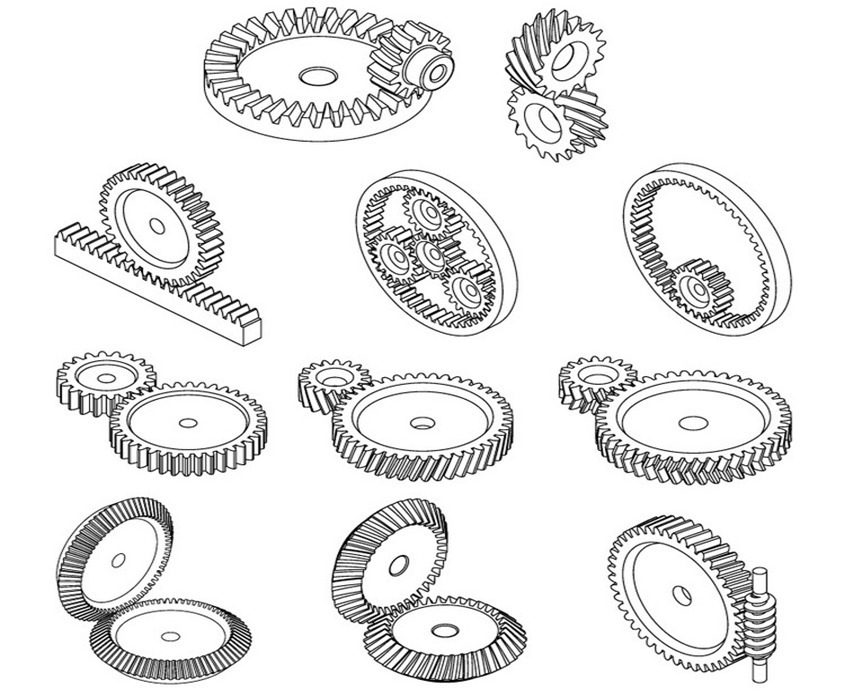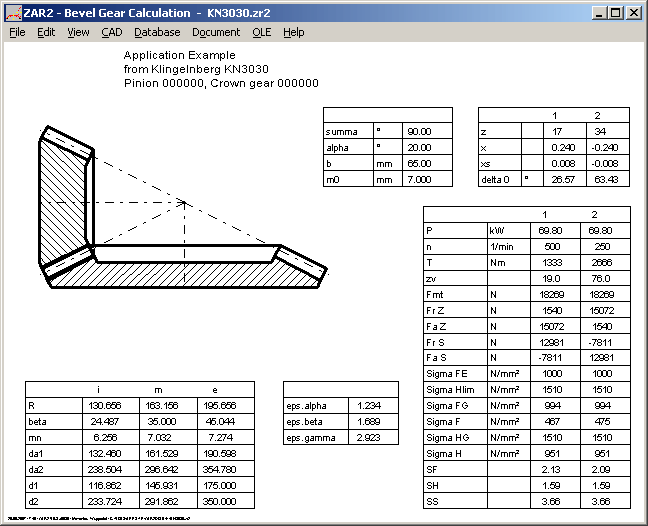A worm gear box must contain a worm and a mating gear (helical gear) and normally the axis of the worm is perpendicular to the axis of the gear. Look at the picture below:
The mating worm gear teeth have a helical lead. (Note: The name 'worm wheel' is often used interchangeably with 'worm gear'.) A central section of the mesh, taken through the worm's axis and perpendicular to the worm gear's axis, as shown in Figure 9-2, reveals a rack-type tooth of the worm, and a curved involute tooth form for the worm gear. ZAR3+ generates true-scale drawing of worm and worm gear. ZAR3+ provides an additional input window for modifications of tooth height factors and profile shift coefficient x. These functions are useful for design of complementary gears of steel worm and plastic worm gear. ZAR3+ calculates tooth thickness and over pin/ball diameters (OPD).
Where,
Calculations for worm gears are the same as for. Worm Gearing 50 Lead Angle Worm threads are. Perature and the details of the gear mesh design. Worm gear.pdf - Free download as PDF File (.pdf), Text File (.txt) or read. Of a worm gear is related to its circular pitch and number of teeth Z by the formula.
D1 – Pitch Diameter of Worm
D2 – Pitch Diameter of Gear
C – Centre to Centre Distance between the Worm and the Gear
This worm gear design tutorial will discuss up to the selection of the module and pitch and the calculation of the number of teeth, pitch circle diameter and centre to centre distance between the worm and gear. We will use the AGMA formulae for doing the calculations. Design calculations of the other aspects of the worm gear will be discussed in a subsequent part of the tutorial.
Steps of the Design Calculation
- The axial pitch of the worm and the circular pitch of the gear must be same for a mating worm and gear. We will use the term Pitch (P) for both the pitch in this tutorial.
- Also, the module of the worm as well as the gear must be equal for a mating worm and gear.
- Now, let’s say we have the following design input:
Speed of the Worm (N1) = 20 RPM
Speed of the Gear (N2) = 4 RPM
- And, we have to find out the Module (m), Pitch (P), Number of helix of Worm (T1), Number of teeth of Gear (T2), Pitch circle diameter of Worm (D1), Pitch circle diameter of Gear (D2), Centre to centre distance(C).
- Select the suitable module and its corresponding pitch from the following AGMA specified table:
Module m (in MM) – Pitch P (in MM)
2 ————————-6.238
Worm Gear Calculation
2.5 ———————- 7.854

3.15 ——————— 9.896
4 ————————- 12.566
5 ————————- 15.708
6.3 ———————– 19.792
8 ————————– 25.133
10 ————————- 31.416
12.5 ———————– 39.27
16 ————————– 50.625
20 ————————– 62.832
- Say, we are going ahead with the Module as 2 and the Pitch as 6.238.
- Use the following gear design equation:
N1/N2 = T2/T1
And, we will get:
T2 = 5 * T1……………….Eqn.1
- Now use the following AGMA empirical formula:
T1 + T2 > 40………………Eqn.2
- By using the two equations (Eqn.1 & Eqn.2), we will get the approximate values of

T1 = 7 andT2 = 35
- Calculate the pitch circle diameter of the worm (D1) by using the below AGMA empirical formula:
D1 = 2.4 P + 1.1
= 16.0712 mm
- The following AGMA empirical formula to be used for calculating the pitch circle diameter of the gear (D2):
D2 = T2*P/3.14
= 69.53185 mm
- Now, we can calculate the centre to centre distance (C) by the following equation:
C = (D1 + D2)/2
= 42.80152 mm
- The below empirical formula is the cross check for the correctness of the whole design calculation:
(C^0.875)/2 <= D1 <= (C^0.875)/1.07
Observe that our D1 value is falling in the range.
Conclusion
The worm gear box design calculation explained here uses the AGMA empirical formulas. A few worm gear design calculator are available on web, and some of them are free as well.
Free Worm Gear Calculator

In the next worm gear box design calculation tutorial we will discuss the force analysis of a worm gear box.
Related Reading
Worm Gear Ratio Formula
Helical Gear vs. Spur Gear: If you have observed a spur gear application, you may have noticed that spur gear can be replaced by helical gear. Where should a helical gear should be used? What are the benefits and disadvantages of doing so?
Input Parameters
Teeth type - common or spiral
Gear ratio and tooth numbers
Pressure angle (the angle of tool profile) α
How to run bully scholarship edition in windowed mode. Then I downloaded one of the best mods called 'Super Mod', and it was still running normally. Only thing I can hope for is Bully 2 or Bully remake in the future. Well, just some pirace games of Bully works for Windows 10, but Rockstar make this game to Rest in Peace. At first crashes but then the game was normal. But now the game crashes frequently.
Module m (With ANSI - English units, enter tooth pitch p = π m)
Unit addendum ha*
Unit clearance c*
Unit dedendum fillet rf*
Face widths b1, b2
Unit worm gear correction x
Worm size can be specified using the:
- worm diameter factor q
- helix direction γ
- pitch diameter d1
Auxiliary Geometric Calculations
Calculated parameters
Common gearing ZN
Axial module
mn = m | |
Normal module | mx = mn cos γ |
Axial pressure angle | αx = a |
Normal pressure angle | αn = arctg (tg α cos γ) |
Helix/lead angle | γ = arcsin z1/q |
Spiral gearing ZA
Axial module
mn = mx / cos γ | |
Normal module | mx = m |
Axial pressure angle | αn = arctg (tg α cos γ) |
Normal pressure angle | αx = α |
Helix/lead angle | γ = arctan z1/q The configuration details for this step can be found in the installation guide. |
Normal tooth pitch
Axial tooth pitch
px = πx
Basic tooth pitch
Lead
pz = z1 px
Virtual/alternate number of teeth
Helix angle at basic cylinder
sin γb = sin γ cos αn

Worm pitch cylinder diameter
Worm gear pitch circle diameter
Worm Gear Design Calculation Pdf Example
d2 = z2 mx
Worm outside cylinder diameter
Worm gear outside circle diameter
da2 = d2 + 2m (ha* + x)
Worm root cylinder diameter
Worm gear root circle diameter
df2 = d2 - 2m (ha* + c* - x)
Worm rolling(work) circle diameter
Worm gear rolling(work) circle diameter
dw2 = d2
Worm gear root circle diameter
Center distance
Chamfer angle of worm gear rim
Worm tooth thickness in normal plane
Worm gear tooth thickness in normal plane
Worm tooth thickness in axis plane
sx1 = s1 / cos γ
Worm gear tooth thickness in axis plane
Work face width
bw = min (b1, b2)
Contact ratio
εγ = εα + εβ
where:
Minimum worm gear tooth correction
where:
ha*0 = ha* + c* - rf* (1 - sin α)
c = 0.3 | for α = 20 degrees |
c = 0.2 | for α = 15 degrees |